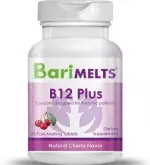By Kelly Morris
(Please note that this article is the result of research done by Foodie News writer Kelly Morris. Kelly is not a nutritionist or a physician, but is simply reporting her findings through this article. The contents of this article are for informational purposes only. Please consult your own physician regarding your personal vitamin dosages and lab reports. )
Weight loss surgery folks usually worry about vitamin deficiency, since they’re fairly common after surgery and can cause such serious problems. The opposite problem, though, known as vitamin toxicity, can sometimes happen. It is possible to take too much of a good thing.
Vitamin toxicity usually only occurs when people take large amounts of vitamin supplements. It’s highly unlikely that anyone would get too much of any one vitamin just from the food that they eat. Weight loss surgery folks are advised to take a number of vitamin and mineral supplements, though. In order to make sure we don’t take too much of anything, it’s important to get blood tests done at least once a year.
What happens if we take too much?
Some vitamins, like the B vitamins, are water soluble, so we don’t normally store those in our bodies. If we take more than we need, the excess is usually eliminated from our bodies in our urine. Other vitamins, though, like vitamins A and D, are fat soluble and we do store those in our bodies. Therefore it’s possible for too much of those vitamins to build up and cause problems. Minerals, like zinc and iron, can also build up in our bodies and cause problems.
Vitamin D Toxicity
According to the Mayo Clinic, vitamin D toxicity is rare, even in people that take large doses of vitamin D3. They say people that take 50,000 IU D3 daily for several months may develop toxicity, however. Problems associated with vitamin D toxicity include the buildup of too much calcium in your blood, nausea and vomiting, and kidney problems. Now, weight loss surgery folks may require large doses of D3, but if you’re taking a large dose, it’s really important to get labs done frequently to make sure your level doesn’t get too high.
Vitamin A Toxicity
Vitamin A toxicity is also rare, but since it is a fat soluble vitamin, it can occur if you take large doses regularly. According to Medscape, symptoms of vitamin A toxicity can include nausea, vomiting, diarrhea, headache, blurred vision, muscle and joint pain, and hair loss.
Iron Toxicity
Iron deficiency is fairly common in weight loss surgery folks, especially those with malabsorptive surgeries. However, taking very large doses of iron can lead to iron toxicity. Ironically, some of the symptoms of iron toxicity are similar to the symptoms of iron deficiency, including headache, fatigue, and hair loss. Therefore, if you have symptoms of iron deficiency, it’s a good idea to get your iron level checked before you increase your iron supplementation just to make sure the problem really is an iron deficiency. Iron toxicity can lead to liver problems, which can be quite serious.
Zinc Toxicity
Zinc toxicity is also rare, but the National Institutes of Health reports that taking large doses, such as 150 mg to 450 mg daily, can lead to toxicity. Symptoms of zinc toxicity include nausea, vomiting, diarrhea, and headache. Zinc toxicity also prevents the proper absorption of some other minerals, like iron and copper.
How much is too much?
That’s going to vary from person to person, based on which type of weight loss surgery you had and how well your body absorbs things. To find out if you’re taking too much of anything or if you need to take more, make sure you get your labs done at least once a year.
Keep in mind that the vitamins and minerals I talked about here are not the only ones that can be harmful in large amounts. It’s a good idea to talk to your doctor before taking large doses of any vitamin or mineral.
Next month I’ll tell you about calcium: why we need it, what kind we need, how much we need, how to make sure we’re absorbing it, and more. As always, feel free to contact me at bariatricfoodie@yahoo.com if you have any questions about vitamins and I’ll do my best to help, though you need to talk to your doc if you need medical advice.
 Got a vitamin question? Kelly is happy to research it for you! Hit her up at bariatricfoodie@yahoo.com!
Got a vitamin question? Kelly is happy to research it for you! Hit her up at bariatricfoodie@yahoo.com! Bariatric Foodie Play with your food
Bariatric Foodie Play with your food

